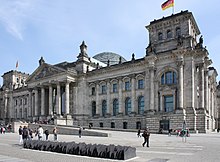Franziska Kessel
Franziska Kessel (born January 6, 1906 in Cologne , † April 23, 1934 in Mainz ) was a German politician ( KPD ) and resistance fighter against National Socialism .
Life
After attending the elementary and advanced training school in Cologne, Kessel did an apprenticeship as a saleswoman and later worked in this profession. From 1920 to 1928 she was a member of the Central Association of Employees (ZdA), from 1928 a member of the General Association of Employees in Public Enterprises and the Movement of People and Goods. In 1921 she joined the Socialist Workers' Youth , which she left again in 1923 because she no longer wanted to support the reformist policy of this organization. In 1925/26 she was a member of the International Socialist Combat League , and in 1928 she finally became a member of the KPD. Because of her communist activities, she was sentenced to one year in prison by the Reich Court in the summer of 1930 . After her release, Kessel became head of the women's department at the KPD district leadership Hesse - Frankfurt . For a while, Kessel worked as a maid and nanny in the household of the politician Erika Buchmann and her husband Albert Buchmann , the KPD member of the Reichstag.
From July 1932 to March 1933 Franziska Kessel was a member of the KPD in the Reichstag .
After the " seizure of power " by the National Socialists in 1933, she continued to work underground. Kessel drove as an instructor through the Hessen-Frankfurt district and visited a large number of local groups of the KPD in order to prepare them for the fighting conditions in the illegality. In addition, she collected eyewitness reports about the Nazi terror against the German labor movement. This material was used in preparation for the European Anti-Fascist Workers' Congress, which took place in June 1933 in the Pleyel Hall in Paris .
On April 4, 1933, she was arrested in Bad Nauheim. Robert Otto , also a member of the KPD and from 1933 an informant for the Gestapo , had betrayed and helped with the arrest . He lured her to the Ludwigsbrunnen, on the pretext that she should hand over material there, since he could not come himself, a secret word ("Sonnenklar") had been agreed so that she could identify herself. After the secret word was given by the then chief of the criminal investigation department, the groom, she identified herself. She was arrested on the spot. Kessel had been warned by comrades that Otto was a spy, but went to the agreed meeting point anyway. Otto appeared as a witness against her in two trials. On November 17, 1933, the Darmstadt Higher Regional Court sentenced her to three years in prison for “preparing for high treason ” . In the indictment, Kessel was charged with establishing illegal links between communists and distributing leaflets with anti-subversive content. She went blind while in custody, whether as a result of the torture or the generally appalling conditions of detention is unclear. Kessel died under unexplained circumstances in the penitentiary department of the Mainz regional court prison on Diether-von-Isenburg-Strasse. According to a report by Cäcilie Barbara Schaeffer , a former KPD member of the state parliament who was also imprisoned in Mainz at the same time, Kessel committed suicide .
Honors
- The Franziska-Kessel-Strasse in Mainz-Oberstadt and Frankfurt am Main- Heddernheim are named after her.
- Since 1992, one of the memorial plaques for the 96 members of the Reichstag murdered by the National Socialists has been commemorating Kessel in Berlin near the Reichstag .
literature
- Luise Kraushaar (Ed.): German resistance fighters 1933-1945. Biographies and letters . Volume 1. Dietz, Berlin 1970, pp. 488f.
- Hermann Weber , Andreas Herbst : German communists. Biographical Handbook 1918 to 1945 . 2nd, revised and greatly expanded edition. Dietz, Berlin 2008, ISBN 978-3-320-02130-6 ( online [accessed January 23, 2012]).
- Johannes Chwalek: “For the time being I am still in solitary confinement” - Franziska Kessel (1906–1934) . In: Mainzer Geschichtsblätter , ed. from the Association for Social History Mainz e. V., Issue 15 (2014), pp. 123–146.
Web links
- Curriculum vitae on the website of the memorial for the victims of National Socialism in the Wolfenbüttel correctional facility
- Franziska Kessel's biography
- Franziska Kessel in the database of members of the Reichstag
Individual evidence
- ↑ Johannes Chwalek: “For the time being I'm still in solitary confinement” - Franziska Kessel (1906–1934), in: Mainzer Geschichtsblätter 15 (2014), pp. 123–146, here p. 129.
- ↑ Johannes Chwalek: “For the time being I'm still in solitary confinement” - Franziska Kessel (1906–1934), in: Mainzer Geschichtsblätter 15 (2014), pp. 123–146, here p. 142.
- ↑ Martin Schumacher (Ed.): MdR The Reichstag members of the Weimar Republic in the time of National Socialism. Political persecution, emigration and expatriation 1933-1945. Droste-Verlag, Düsseldorf 1991, ISBN 3-7700-5162-9 , p. 326f.
| personal data | |
|---|---|
| SURNAME | Kessel, Franziska |
| BRIEF DESCRIPTION | German politician (KPD), MdR and resistance fighter |
| DATE OF BIRTH | January 6, 1906 |
| PLACE OF BIRTH | Cologne |
| DATE OF DEATH | April 23, 1934 |
| Place of death | Mainz |


